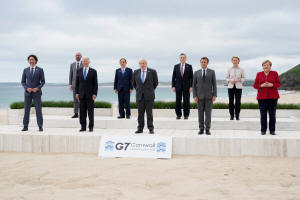G7 to counter China's clout with big infrastructure project - senior
U.S. official
 Send a link to a friend
Send a link to a friend
 [June 12, 2021]
By Steve Holland and Michael Holden [June 12, 2021]
By Steve Holland and Michael Holden
CARBIS BAY, England (Reuters) -The Group of
Seven will seek to rival China’s multi-trillion-dollar Belt and Road
initiative on Saturday by announcing a global infrastructure plan to
help developing nations, a senior official in U.S. President Joe Biden's
administration said.
The G7 is trying to find a coherent response to the growing
assertiveness of President Xi Jinping after China's spectacular economic
and military rise over the past 40 years.
The U.S. official, who spoke to reporters on condition of anonymity,
said the United States would also push the other G7 leaders for
"concrete action on forced labour" in China, and to include criticism of
Beijing in their final communique from a three-day summit in southwest
England.
"This is not just about confronting or taking on China," the official
said. "But until now we haven't offered a positive alternative that
reflects our values, our standards and our way of doing business."

China’s Belt and Road Initiative (BRI) is a multi-trillion-dollar
infrastructure scheme that Xi launched in 2013, involving development
and investment initiatives that would stretch from Asia to Europe and
beyond.
More than 100 countries have signed agreements with China to cooperate
in BRI projects like railways, ports, highways and other infrastructure.
Critics say Xi's plan to create a modern version of the ancient Silk
Road trade route to link China with Asia, Europe and beyond is a vehicle
for the expansion of Communist China. Beijing says such doubts betray
the "imperial hangover" of many Western powers that humiliated China for
centuries.
CHINA'S RISE
The re-emergence of China as a leading global power is considered to be
one of the most significant geopolitical events of recent times,
alongside the 1991 fall of the Soviet Union that ended the Cold War.
China in 1979 had an economy that was smaller than Italy’s, but after
opening to foreign investment and introducing market reforms, it has
become the world’s second-largest economy and is a global leader in a
range of new technologies.
Leaders of the G7 - the United States, Canada, Britain, Germany, Italy,
France and Japan - want to use their gathering in the seaside resort of
Carbis Bay to show the world that the richest democracies can offer an
alternative to China's growing clout.
The U.S. official said until now, the West had failed to offer a
positive alternative to the "lack of transparency, poor environmental
and labour standards, and coercive approach" of the Chinese government
that had left many countries worse off.
[to top of second column]
|

Canadian Prime Minister Justin Trudeau, European Council President
Charles Michel, U.S. President Joe Biden, Japan's Prime Minister
Yoshihide Suga, British Prime Minister Boris Johnson, Italy's Prime
Minister Mario Draghi, French President Emmanuel Macron, European
Commission President Ursula von der Leyen and German Chancellor
Angela Merkel pose for a group photo at the G7 summit, in Carbis
Bay, Britain, June 11, 2021. Patrick Semansky/Pool via REUTERS

"So tomorrow we’ll be announcing ‘build back better
for the world,’ an ambitious new global infrastructure initiative
with our G7 partners that won’t just be an alternative to the BRI,"
the official said.
According to a Refinitiv database, as of mid-last year, more than
2,600 projects at a cost of $3.7 trillion were linked to the Belt
and Road Initiative, although the Chinese foreign ministry said last
June that about 20% of projects had been seriously affected by the
COVID-19 pandemic.
In March, Biden said he had suggested to British Prime Minister
Boris Johnson, hosting the G7 summit, that democratic countries
should develop their own rival scheme.
FORCED LABOUR
In talks, Biden will also press the other leaders to make clear that
they believe forced labour practices are an affront to human dignity
and "an egregious example of China’s unfair economic competition".
"We’re pushing on being specific on areas like Xinjiang where forced
labour is taking place and where we have to express our values as a
G7," the official said of the final communique to be issued at the
end of the summit on Sunday.
China denies all accusations of abuse in the Xinjiang region.
There were no specifics on how the global infrastructure scheme
would be funded. The plan would involve raising hundreds of billions
in public and private money to help close a $40 trillion
infrastructure gap in needy countries by 2035, the official said.

The aim was to work with the U.S. Congress to supplement existing
development financing "with the hope that, together with G7
partners, the private sector and other stakeholders, we soon be
collectively catalyzing hundreds of billions of dollars in
infrastructure investment for low and middle income countries that
need it".
(Reporting by Steve Holland and Michael HoldenEditing by Guy
Faulconbridge and Frances Kerry)
[© 2021 Thomson Reuters. All rights
reserved.] Copyright 2021 Reuters. All rights reserved. This material may not be published,
broadcast, rewritten or redistributed.
Thompson Reuters is solely responsible for this content. |